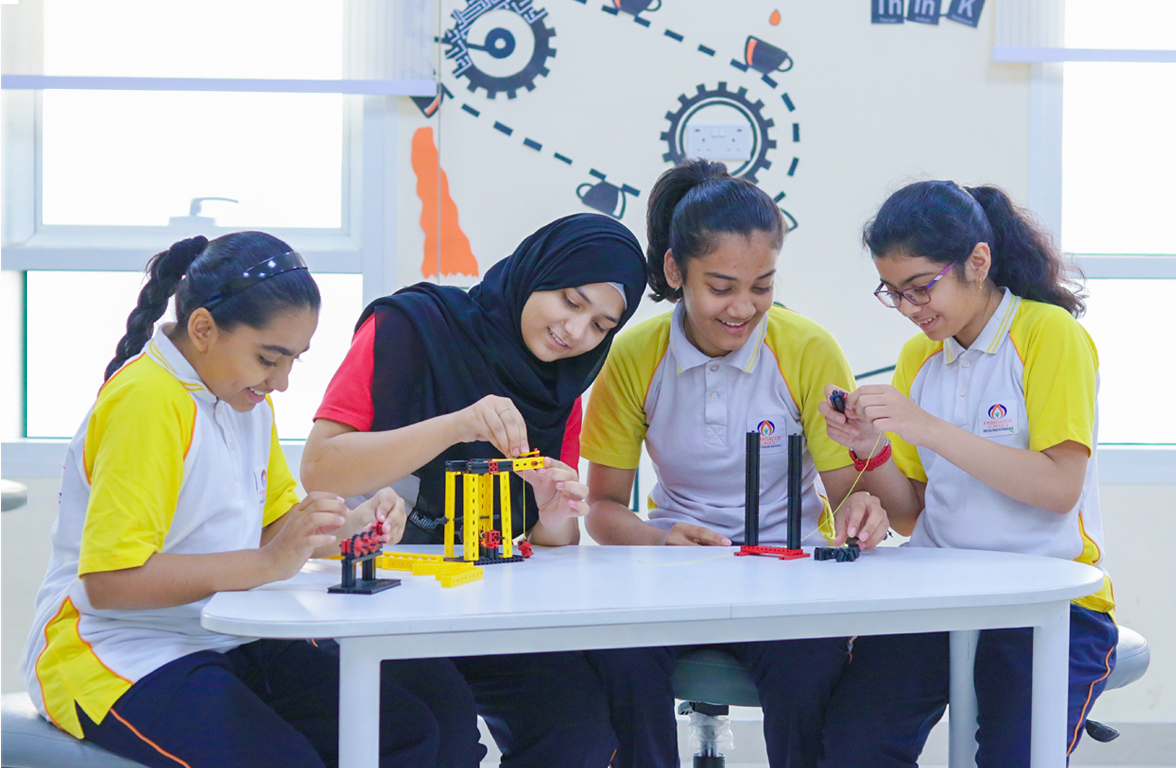Well the answer isn’t totally straightforward, because you can be an IB school which bases its content on the British Curriculum, just like we do at Ambassador International Academy.
The International Baccalaureate (IB) is a framework ‘curriculum’ into which content is selected by the school, with a strong focus on skills and a wide variety of assessment approaches, whilst the United Kingdom (UK) Curriculum is a more traditionally exam driven system which focuses on key content throughout each year of learning up to pre-university level with the number of subjects at that level reducing, to steer students into a particular career pathway.
Structure:
IB: The IB curriculum is a comprehensive, holistic program offered to students aged 3 to 18/19. It consists of three main programs: the Primary Years Programme (PYP), the Middle Years Programme (MYP), and the Diploma Programme (DP) along with a more vocational pathway the Careers Related Programme (CP).
UK Curriculum: The UK Curriculum is commonly known as the National Curriculum of England. It is divided into five key stages: Early Years Foundation Stage (EYFS 3-5years old), Key Stage 1 (KS1 5-8 years old), Key Stage 2 (KS2 8-11 years old), and Key Stage 3 (KS3 11-14 years old) Key Stage 4 (KS4 14 –16 years old IGCSEs) and Key Stage 5 (KS5 16-18 years old International A-Levels).
Philosophical Approach:
IB: The IB curriculum emphasizes a truly holistic education that is based on research with universities and employers which develops well-rounded individuals. It focuses on the development of critical thinking skills, international-mindedness, and the exploration of global issues through a set of characteristics known as the IB Learner Profile . The content of the IB Diploma Programme and Careers Related Programme is updated regularly with the most up to date research and thinking from across the range of subject areas, especially in science and humanities subjects.
UK Curriculum: The UK Curriculum (like other national curricula of other countries) places a strong emphasis on subject knowledge and skill development related to academic subjects. It follows a more traditional approach to education, focusing on academic achievements and preparing students for traditional external examinations, often through Cambridge or Edxcel examination boards for IGCSE, O-Level or A-Levels.
Assessment:
IB: The IB uses a variety of assessment methods, including coursework, exams, projects, oral presentations, and extended essays. It aims to assess students' understanding and application of knowledge across a range of disciplines including entrepreneurial skills in the areas of creativity, community action and service. The research skills of the Personal Project (Grade 10) and the Extended Essay (Grades 11 and 12) provide exactly the right skills for university success along with the assessments at Diploma and Careers Related Programme level.
UK Curriculum: The UK Curriculum utilizes standardized assessments and external examinations. GCSEs are typically taken at the end of KS4, while A-levels are taken at the end of KS5. These qualifications play a significant role in university admissions. UK curriculum schools will provide very school specific additional programmes to supplement the non-obligatory elements of learning beyond academics.
Flexibility:
IB: The IB offers a great deal of flexibility in terms of subject choices, allowing students to select subjects from different groups and levels of difficulty. It also requires students to complete a range of core components, such as the Theory of Knowledge (TOK) essay, Creativity, Activity, Service (CAS), and the Extended Essay. It is widely regarded as just about the most rigorous all round academic programme at secondary level.
UK Curriculum: The UK Curriculum provides a more structured approach with a predetermined set of subjects and content for each key stage. Students typically specialize in a narrower range of subjects as they progress through the system making it easier to focus on career pathway progression, which can be beneficial for those very focused on specific subject offerings at university.
Suitability for Further Studies Around the World:
It is important to remember that university admissions systems and requirements vary enormously from country to country. Both IB and UK can be suitable pathways for students to achieve places at top universities and colleges for all subjects across many countries. There are certain universities that will have specific subject and attainment requirements for some courses, but these requirements can usually be met through either IB or A Levels, but the experience of the student will be quite different over the two pre-university years depending on the route they choose.
IB: Given that throughout the IB programmes there is a focus on developing holistic learners with a strong sense of global citizenship and critical thinking skills, the IB is increasingly seen as the ideal preparation for university level education around the world. The Diploma Programme requires students to follow 6 different courses in at least 5 curriculum areas, it keeps options for a wide variety of university destinations and course options globally. The IB leaves the possibility to change subject levels and to some extent courses open longer, depending on the school guidelines.
UK Curriculum: The more traditional pathway for UK universities, the A Level courses are deeper dives into a narrower selection of 3 or 4 subjects, often within the same area, for example the study of Chemistry, Physics and Mathematics to pursue engineering. This is ideal for those with a very clear focus on what they anticipate studying in the future. It is much harder to change the subjects of A-Levels as the student specializes in fewer subject areas from the start of the first year of their studies.
I have worked with graduating IB students who have been offered places and scholarships around the world, for a huge range of further studies including fashion design in Milan, Medicine in Oxford, Engineering in the Ivy Leagues, Music at Berkely and many, many more. The IB is perfect at giving students the opportunity to pursue their passions, so that they can stand out from the crowds when it comes to university or college applications.
It's important to note that both the IB and UK Curriculum have their strengths and are recognized globally. The choice between them often depends on individual preferences, educational goals, and the availability of schools offering these programs in a particular region.
Given that I am a product of a UK National Curriculum school and have worked in schools in seven countries, some offering UK Curriculum, others offering IB and some offering IGCSE and IB Diploma, I am in the privileged position of being able to see the benefits of both systems.
My advice would be to talk to your child and see which of these two pathways will suit them best. If they are a motivated, creatively minded inquirer with a desire to see and know more of our incredible world, then the IB would be a great fit for them.
Contact us today to learn more about our highly rated school or to find out how you can enroll your child for the new academic year.



